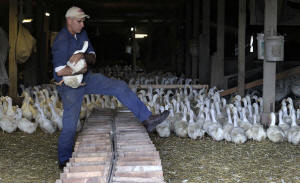Long Island’s last duck farm weighs closure after outbreak leads to
killing of entire flock
 Send a link to a friend
Send a link to a friend
 [January 25, 2025]
By PHILIP MARCELO [January 25, 2025]
By PHILIP MARCELO
NEW YORK (AP) — New York’s Long Island was once synonymous with “duck”
in the culinary world. Now it may lose its last commercial farm.
The avian flu outbreak that has led to the slaughter of millions of
birds at U.S. poultry farms and driven up the price of eggs struck the
Crescent Duck Farm this week, leading federal officials to order the
destruction of the operation’s entire flock.
Doug Corwin, whose family has owned the roughly 140-acre farm since the
1640s, said Friday that a multiday culling of about 100,000 birds has
been completed at the now-quarantined barns in Aquebogue.
His remaining staff will thoroughly sanitize the facility, a process
that could take months.
“We’re just stunned right now,” Corwin, 66, said Friday by phone. “It’s
a very, very sad time. We’re trying our best to work our way through
this, one step at a time.”
He said the family will have to reckon with the future of the
fourth-generation business, which was established in 1908 and is tucked
among the vineyards and agricultural lands of Long Island's North Fork,
about 80 miles (129 km) east of Manhattan.
Corwin said he was forced to lay off 47 of the farm’s 75-member staff,
including many who had worked there for decades as the farm’s revenue
cratered.

“If duck farming isn’t an option, I’m not sure what we’d do,” he said.
“We’re not really set up for anything else.”
Long Island was once a center of duck production in the U.S., thanks to
its abundance of freshwater streams, friendly climate and proximity to
major East Coast cities.
During its heyday in the early 1960s, the region boasted more than 100
farms, producing up to 7.5 million birds annually, or about two-thirds
of the nation’s duck output.
Crescent Duck Farm has been the island’s lone remaining operation for
the better part of a decade, as higher operating costs, tougher
regulations and increasing suburban sprawl took their toll.
Today the farm supplies nearly 4% of all the ducks sold in the country,
supplying restaurants across the Northeast and beyond, including a
number of high-end establishments in New York City, Corwin said.
[to top of second column]
|

Doug Corwin, owner of Crescent Duck Farm, carries a female duck used
for breeding in one of several barns on his property, in Aquebogue,
N.Y., Oct. 29, 2014. (AP Photo/Julie Jacobson, File)
 The key to its longevity has been
the quality of its ducks, which he said have a thick, meaty breast
and just enough skin fat to keep them tender and moist during
cooking.
“The only way we’ve survived on Long Island is by making a duck that
is different from our competition,” Corwin said.
Following the outbreak, the farm was allowed to hold on to several
thousand duck eggs, which he hopes will help rebuild its flock and
preserve the distinctive genetics honed over generations.
The quarantined eggs will first be sanitized and hatched offsite,
with regular testing for any signs of the virus.
But Corwin said he is reluctant to restart without federal approval
for vaccinating poultry — something larger industrial farms oppose
because of its impact on international sales.
Without vaccination, he said, smaller operations will continue to be
at risk of total ruin.
Even now, Corwin said he is not sure how the virus entered the
tightly controlled facility after he noticed signs some of the birds
were amiss last week.
The farm, he said, imposed strict protocols to prevent infection as
bird flu has ravaged poultry operations globally.
Cases of this strain of bird flu jumping into humans is rare. There
have been 67 confirmed human cases and one death reported in the
United States so far, according to federal health officials. Cattle
outbreaks have been reported in several states. Infections in
commercial flocks, though, have become more common. At least 13
million birds have been infected in the past 30 days alone,
according to the USDA, with a handful of farms being effected each
day.
“We had identified weaknesses and tightened everything up,” Corwin
lamented. “It wasn’t enough, I guess.”
All contents © copyright 2025 Associated Press. All rights reserved
 |